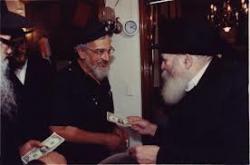
Guest Lecturer, Sarasota Liberal Yeshiva
Growing up, Jewish spirituality appeared to be an oxymoron. Most Jews had fled out of body straight into the intellect in the wake of the trauma of the Holocaust. Feel our feelings? Too painful. I now know there was a post WWII undercurrent of depression and PTSD among my own parents and many of my early Jewish teachers. Hebrew school was painful in many ways, as though we children were being treated like hard drives upon which all possible Jewish knowledge had to be stored lest, G*d forbid, one day any one of us might be the last "Torah" standing. The word "soul," so prevalent in the Torah and Jewish wisdom literature, as I would joyfully discover later in life, wasn't really considered a valuable term in contemporary culture until the attack on the Twin Towers of the World Trade Center. When that attack happened, the vulnerability of being human was profoundly re-triggered.
The need for soulful approaches to living becomes increasingly obvious with each passing day in our world where almost inconceivable levels of violence are being widely reported. When we turn to the literature of Jewish spiritual masters--past and present, much that is fascinating, healing and helpful emerges--as though planted there waiting for us to come seeking.
For example, over two hundred years ago the spiritual master Reb Nachman of Breslov taught that each time a person, including a tzaddik (traditionally the most honorable of persons) loses status due to egregious or intentional error, that individual's "descent is for the sake of ascent." The opportunity to study the full text of this teaching yields great wisdom and personal spiritual growth.
Advances beyond anthropomorphic approaches to G*d can be found surprisingly early in the Jewish wisdom literature. In the 14th Century Rabbi Joseph Gikatilla, in his work Shaarei Orah, Gates of Light, taught the word Adonai, usually translated as "Lord" can be understood as the "Governing Principle" of creation, or in contemporary idiom: the "Source Code." As it happens, humans can hold diametrically opposing experiences to be equally true. So, while Gikatilla's approach is intellectually helpful, humans also benefit from a direction for our feelings, needs and hopes.
Reb Levi Yitzchok of Berditchev had the chuzpah to express himself in his own Kaddish prayer that calls out God as accountable during the time of the pogroms in Eastern Europe. Is his approach a therapeutic wisdom or heretical folly? Beruriah, one of the wise women cited in the Talmud, urges her husband, Rabbi Meir, to step back from his wish for thieves he witnesses to be struck down. She then but suggests that the more healthy and honorable thing to do is to pray for them to change their ways. Her approach fits well with the more recent phenomenon of Mussar. A progenitor of Mussar, Rabbi Mendel of Satanov, authored the masterful tiny volume Cheshbon ha-Nefesh--Accounting of the Soul where he guides us in how to cultivate soulful living through eighteen qualities such as deliberation, equanimity, orderliness and trust.
Contemporary Jewish spiritual masters have included Rabbi Zalman Schachter-Shalomi, Z'l, his soul ascended into Mystery this summer. Reb Zalman's vast corpus of work not only includes Hassidic masters, but also his own powerful guidance on matters such as effective forms of prayer, relationships with other faith traditions and "spiritual eldering," pathways of awareness, awe and comfort for facing and moving into one's own death.
We surely cannot speak of contemporary spiritual masters without looking into the works of Aviva Zornberg. In her volume The Particulars of Rapture: Reflections on Exodus, she bids us to look into the spiritual territory of fear through a question that occurs across Torah, "Mah--what?" "What is this that you have done?" (Gen 3:13) "What is it that you have done to us?" (Ex 14:2) "What are you crying out to me?" (Ex 14:15) "What are we?" (Ex 16:7,8) and many more.
While I could cite an infinitude of profound points for exploration from the spiritual masters of the Jewish tradition, it is nourishing enough to begin with a few.
-------------------------------------------------------------------------------------------------------
For the above reasons we'll be delving into the wisdom teachings of six to eight different Jewish spiritual masters during a course titled: "Reclaiming Judaism as a Spiritual Practice: Exploring Works and Practices of Jewish Spiritual Masters" that I am honored to be teaching at the Sarasota Liberal Yeshiva all Friday mornings throughout February and March 2015 on the Campus of the Jewish Federation of Sarasota-Manatee from 9:30-10:45am. To register ($60 plus books/materials, contact: Marden Paru, Dean of the Sarasota Liberal Yeshiva: mailto:marden.paru@gmail.com
Photo Credit: R'Zalman and R'Schneerson